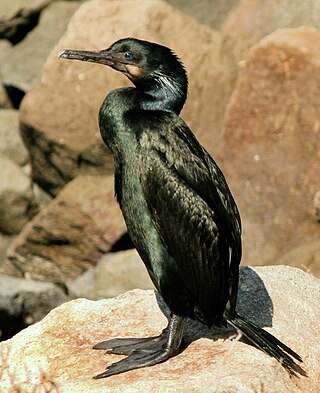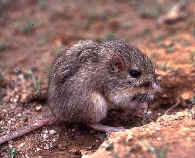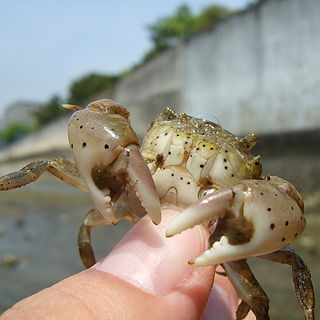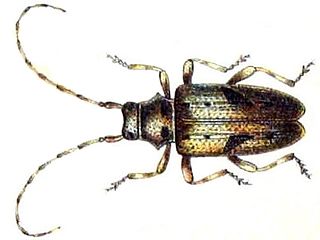Related Research Articles

Brandt's cormorant is a strictly marine bird of the cormorant family of seabirds that inhabits the Pacific coast of North America. It ranges, in the summer, from Alaska to the Gulf of California, but the population north of Vancouver Island migrates south during the winter. Its specific name, penicillatus is Latin for a painter's brush, in reference to white plumes on its neck and back during the early breeding season. The common name honors the German naturalist Johann Friedrich von Brandt of the Academy of Sciences at St. Petersburg, who described the species from specimens collected on expeditions to the Pacific during the early 19th century.

The white-tipped tufted-tailed rat is a rodent endemic to Madagascar. It is known from only two specimens, one collected from Ampitambe forest in 1895 or 1896 and the second in 2000. It is listed by the International Union for Conservation of Nature (IUCN) as an endangered species due to habitat loss.

The desert pocket mouse is a North American species of heteromyid rodent found in the southwestern United States and Mexico. True to its common name, the medium-sized desert pocket mouse prefers sandy, sparsely vegetated desert environments.

Medionidus penicillatus, the gulf moccasinshell, is a rare species of freshwater mussel in the family Unionidae, the river mussels. This aquatic bivalve mollusk is native to Alabama, Florida, and Georgia in the United States, where it is in decline and has been extirpated from most of the rivers it once inhabited. It is a federally listed endangered species of the United States.

Hemigrapsus takanoi, the brush-clawed shore crab or Asian shore crab, is a small crab of the family Varunidae that lives on rocky shores surrounding the Pacific Ocean, and which is invasive along the European coastlines. This crab is omnivorous and eats small fish, invertebrates and algae.

Hemigrapsus penicillatus is a species of crab. The native range of Hemigrapsus penicillatus extends from the Russian Far East along the coasts of Japan, China, Taiwan and Korea, as far south-west as Hong Kong. Although the species was reported from Hawaii in 1903, this is likely to have been an error; there are no recent records of the species in the central Pacific. Reports of H. penicillatus on the coasts of Europe refer to a related species, H. takanoi, which was only distinguished from H. penicillatus in 2005, several years after its discovery in Europe. Hemigrapsus penicillatus lives in the intertidal zone on stony or muddy shores.

Pogonocherus hispidulus, the greater thorn-tipped longhorn beetle, is a species of flat-faced longhorns beetle in the family Cerambycidae.

Pogonocherini is a tribe of longhorn beetles of the subfamily Lamiinae.

Panulirus penicillatus is a species of spiny lobster that lives on shallow rocky and coral reefs in the tropical Indo-Pacific region. Common names for this spiny lobster include variegated crayfish, tufted spiny lobster, spiny lobster, Socorro spiny lobster, red lobster, pronghorn spiny lobster, golden rock lobster, double spined rock lobster and coral cray. It has a very wide range and the International Union for Conservation of Nature has assessed its conservation status as being of "least concern".

Pogonocherus decoratus is a species of beetle in the family Cerambycidae. It was described by Léon Fairmaire in 1855. It has a very wide distribution throughout Europe. It measures between 4 and 6 mm. It feeds on Pinus sylvestris.
Pogonocherus ovatoides is a species of beetle in the family Cerambycidae. It was described by Rapuzzi and Sama in 2014.

Pogonocherus ovatus is a species of beetle in the family Cerambycidae. It was described by Johann August Ephraim Goeze in 1777, originally under the genus Cerambyx. It has a wide distribution throughout Europe, although it has become extinct in several countries, including Luxembourg, Belgium and the Netherlands. It measures between 4 and 6 mm. It contains the varietas Pogonocherus ovatus var. subovatus.
Pogonocherus anatolicus is a species of beetle in the family Cerambycidae. It was described by Daniel in 1898. It is known from Syria, Cyprus, and Turkey.
Pogonocherus caroli is a species of beetle in the family Cerambycidae. It was described by Mulsant in 1863. It is known from France, Algeria, Tunisia, Spain, and Scotland.
Pogonocherus cedri is a species of beetle in the family Cerambycidae. It was described by Peyerimhoff in 1916. It is known from Algeria. It feeds on Cedrus atlantica and Abies numidica.
Pogonocherus dimidiatus is a species of beetle in the family Cerambycidae. It was described by Blessig in 1873. It is known from Russia, China, North Korea, South Korea, and Japan.

Pogonocherus hispidus is a species of beetle in the family Cerambycidae. It was described by Carl Linnaeus in 1758, originally under the genus Cerambyx. It has a wide distribution throughout Europe and North Africa. It contains the varietas Pogonocherus hispidus var. rufescens.
Pogonocherus perroudi is a species of beetle in the family Cerambycidae. It was described by Mulsant in 1839. It has a wide distribution between Europe and North Africa. It feeds on several species of Pinus.
Pogonocherus sieversi is a species of beetle in the family Cerambycidae. It was described by Ganglbauer in 1886. It is known from Georgia, Turkey, Armenia and Ukraine.
Pogonocherus pesarinii is a species of beetle in the family Cerambycidae. It was described by Sama in 1993. It is known from Morocco.
References
- ↑ BioLib.cz - Pogonocherus penicillatus. Retrieved on 8 September 2014.